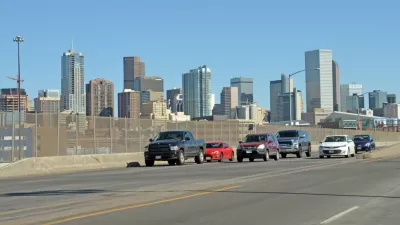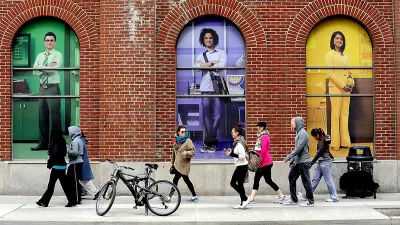The motivations to walk or bike vary greatly by income levels, according to a new study from researchers at the University of Washington. The wealthy, as it turns out, are the outliers.
Jennifer Langston reports: "Lower- and middle-income King County residents who live in denser neighborhoods — with stores, libraries and other destinations within easy reach — are more likely to walk or bike, according to new University of Washington research."
The flip side of the report is that higher-income residents offered the same resources made the choice to use their cars anyway. "Of the environmental factors they studied, the only one that significantly influenced how frequently that group walked or biked was how attractive they found their neighborhoods to be," adds Langston.
Langston provides more detail about the study's methodology as well as more details about the findings. The study will be shared in detail at the Transportation Research Board Annual Meeting, next week.
Hat tip to H. Pike Oliver for sharing the news of the study.
FULL STORY: What motivates people to walk and bike? It varies by income

Alabama: Trump Terminates Settlements for Black Communities Harmed By Raw Sewage
Trump deemed the landmark civil rights agreement “illegal DEI and environmental justice policy.”

Planetizen Federal Action Tracker
A weekly monitor of how Trump’s orders and actions are impacting planners and planning in America.

The 120 Year Old Tiny Home Villages That Sheltered San Francisco’s Earthquake Refugees
More than a century ago, San Francisco mobilized to house thousands of residents displaced by the 1906 earthquake. Could their strategy offer a model for the present?

In Both Crashes and Crime, Public Transportation is Far Safer than Driving
Contrary to popular assumptions, public transportation has far lower crash and crime rates than automobile travel. For safer communities, improve and encourage transit travel.

Report: Zoning Reforms Should Complement Nashville’s Ambitious Transit Plan
Without reform, restrictive zoning codes will limit the impact of the city’s planned transit expansion and could exclude some of the residents who depend on transit the most.

Judge Orders Release of Frozen IRA, IIJA Funding
The decision is a victory for environmental groups who charged that freezing funds for critical infrastructure and disaster response programs caused “real and irreparable harm” to communities.
Urban Design for Planners 1: Software Tools
This six-course series explores essential urban design concepts using open source software and equips planners with the tools they need to participate fully in the urban design process.
Planning for Universal Design
Learn the tools for implementing Universal Design in planning regulations.
Clanton & Associates, Inc.
Jessamine County Fiscal Court
Institute for Housing and Urban Development Studies (IHS)
City of Grandview
Harvard GSD Executive Education
Toledo-Lucas County Plan Commissions
Salt Lake City
NYU Wagner Graduate School of Public Service





























